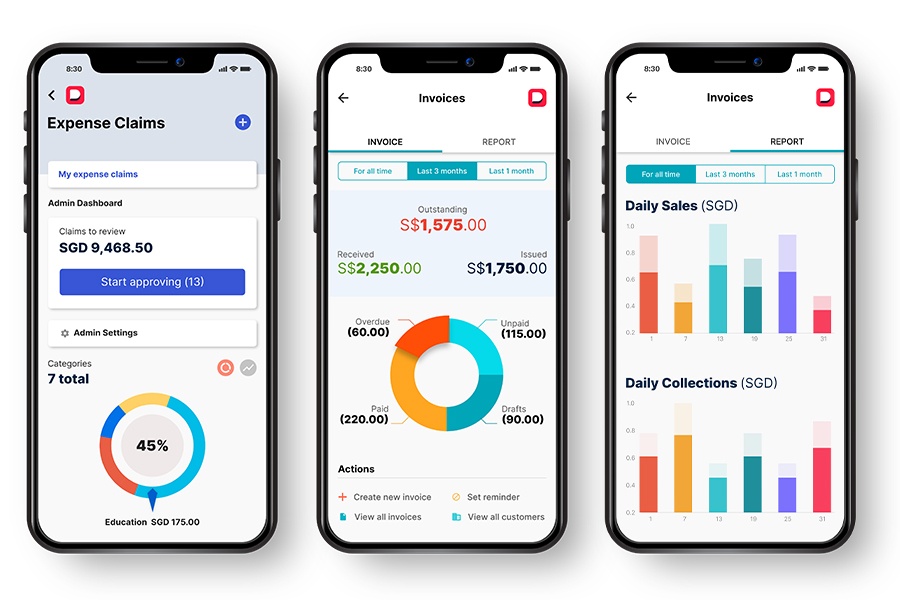The global Covid-19 pandemic has put startups in a dire situation, with many struggling to stay afloat.
A survey by Startup Genome found that globally, 41% of startups have only three months of cash runway left, while 74% have seen revenues decrease as a result of the crisis.
Startup investment has been affected as well. Funds raised by venture capital firms focusing on Asia fell to a seven-year low of US$2.2 billion in the first quarter of 2020, a similar situation that can be seenin the rest of the world.

However, the downturn caused by this global crisis is also providing startups with new opportunities to rework and streamline the way they do business. Companies are moving away from paper-based, desk-bound processes and finding new ways to maximize their resources.
Digital transformation for a new normal
Covid-19 has accelerated the rate at which companies embark on digital transformation, as working from home becomes the new normal.
Working remotely under quarantine restrictions makes processing paper forms, mailing physical invoices to customers, and accessing documents stored in an office filing cabinet difficult, even impossible. Companies have been forced to move away from paper-based systems, using business management tools to take operations online and establish an effective “nerve center”.
Enterprise management tools are one of the most effective ways for startups to undergo a digital transformation, as they are able to streamline and take online many backend office processes such as accounting, invoicing and payroll.
The use of business management software is on the rise in Asia. The Asia-Pacific enterprise software market was valued at US$9,669 million in 2018, and in 2019, companies in the region were expected to spend at least $30 million on such solutions.
Additionally, there has been an upward trend of companies turning towards cloud-based enterprise management solutions in recent years – a pattern that will likely hold, given that the pandemic will still have employees working remotely in the foreseeable future.
Challenges of building a “nerve center”
There are many benefits to using business management tools, such as cutting down operational costs, having better resource management, and improving productivity.
But adopting new tools is tricky. Less than 30% of companies that undertake digital transformation projects succeed, as businesses face challenges in implementing new processes and training people to use unfamiliar software. If not done well, such projects can end up costing companies a lot of money – with nothing to show for it.
While innovative software can help startups resolve problems in their invoicing, accounting, and payroll processes, companies usually need several programs working together in order to benefit from adopting these technologies.
“The irony of the business process is that you need [to have] everything [first] before you have anything,” says Shashank Dixit, the CEO of cloud-based business software solutions provider Deskera.
Take, for example, the payroll process. If a startup purchases a generic payroll system, it may not be able to account for factors such as taxes or benefits. This means the company would need to either do the accounting manually, which defeats the purpose of having a payroll system, or purchase an additional application that can integrate such information into their payroll process.
These applications are often expensive as well, making them inaccessible to smaller companies.
Making enterprise tech accessible
To address the gap in the market for affordable enterprise management solutions, Deskera launched the mobile app version of its integrated business management platform earlier this year.
The business super app, which is free for download, enables small business owners to run operations entirely from their smartphones – a particular boon in emerging mobile-first markets like India and Indonesia.
In these mobile-first markets, people bypass desktop computers and laptops in favor of more affordable mobile devices.
Case in point: In Indonesia, nearly 55% of the population were internet users in 2017. Only about 31% of the urban population owned desktop computers; most people accessed the internet through their smartphones.
And as mobile phones are important in empowering smaller entrepreneurs in these developing markets, having access to mobile business management tools will prove useful.
With Deskera’s app, sales staff can generate quotations and easily convert them into invoices that they can then send across a variety of messaging apps.
These invoices can then be connected to an inventory management platform – where teams can see what is in stock and what needs to be replenished – as well as an accounting system that makes tracking sales easier.
This is especially helpful during the pandemic, as staff working in warehouses can update inventory and shipping information in real-time, enabling the sales team to have easy access to information they need as they close deals remotely.
Photo credit: Deskera
“So far, there is no business application on mobile that is full-featured,” says Dixit. Applications are typically built for desktop, he adds, but running the Deskera app on smartphones gives a company some distinct advantages.
With a mobile phone camera, for example, workers can scan barcodes and record business card information. The app also uses AI to scan receipts for expense claims and inputs the information into the relevant fields. Managers can then review these claims and approve or reject them from the app.
The app also aggregates all data across sales, payroll, and other business functions into a dashboard, giving founders a comprehensive 360-degree look at their business.
By using Deskera’s platform, information that would otherwise be scattered across various paper documents or programs can be viewed at a glance and analyzed in more detail – something that’s particularly useful for startups now as they evaluate their operations in order to reduce burn rates and stay afloat.
The mobile app can also be seamlessly connected to Deskera’s desktop software, allowing teams to access information wherever and whenever they need to – something that is especially useful as working from home has become the norm.
Businesses may need to scale up to the desktop platform in order to access other services in Deskera’s suite, such as payroll management and bank reconciliation. Connectivity and interoperability between the two platforms goes a long way in ensuring a smoother digital transition.
This is also great for startups in the long-term: As the business expands, users can be added to the platform as required, enabling information to flow easily between the different parts of a company.
Seizing the opportunity for growth
While the months ahead still look gloomy, Dixit believes that the pandemic has created an opportunity for companies to look inward and go back to the basics.
For startups, his additional advice is to look ahead and make preparations for what comes after the outbreak. Aside from streamlining operations and creating a “nerve center” to keep things moving even with everyone working remotely, businesses must face challenges head-on by pivoting to new directions, reworking their pricing models, and building stronger relationships with their customers.
“Use [this time] as a testing ground for saving costs and running your business more efficiently,” Dixit says. “This is the time to make your business more ready for the future. Those who [adapt] will survive, but for those who don’t, there will be challenges.”
Deskera is a cloud-based business software provider that enables businesses to run their operations more efficiently. Its new mobile app, which has had 300,000 downloads to date, allows owners to manage their businesses from their smartphones. It is available on both iOS and Android.



